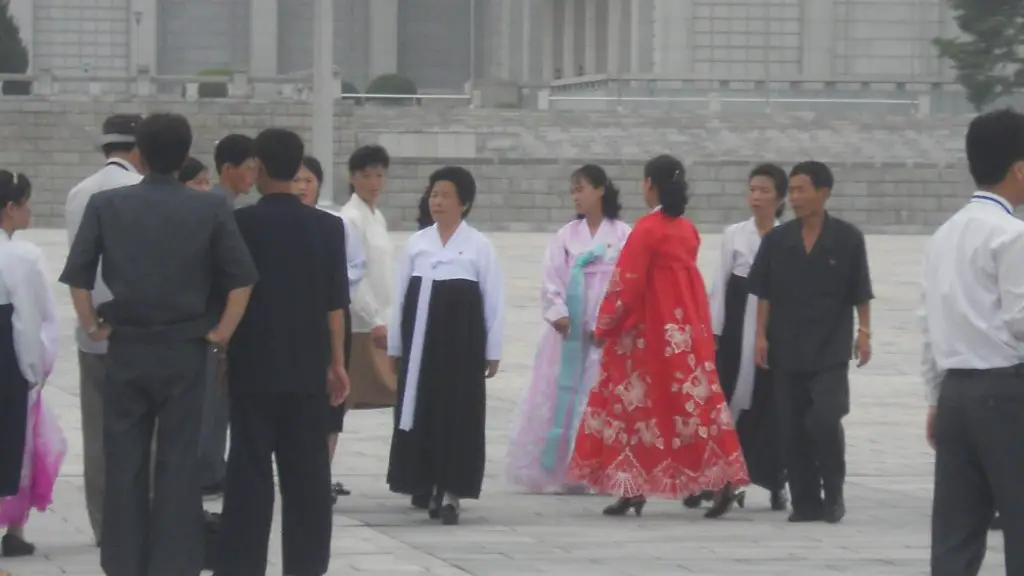Economic Situation in North Korea
North Korea’s economy is one of the least developed and poorest in the world. It is heavily reliant on foreign aid and limited trade. In recent years, the North Korean economy has suffered from serious economic problems, primarily caused by an inefficient centrally planned economic system, bad industrial and agricultural practices, and the lack of international economic investment.
Food production is estimated to have decreased in 2019, with the World Food Programme saying that more than 10 million North Koreans, or 40% of the entire population, suffer from a shortage of food. This is due, in part, to long-term infrastructure problems, as well as the extreme levels of sanctions imposed by countries, including the United States, in response to North Korea’s nuclear weapons program.
North Korea’s main trading partners are China and South Korea, though trade has been limited by sanctions. China is North Korea’s largest trading partner and provider of aid, providing nearly 90% of North Korea’s imports, including fuel, food, and medical supplies. In the past, China has played an important role in propping up the North Korean economy, offering credit and in-kind aid payments.
China’s Interest in North Korea
China has long been interested in North Korea, both from a strategic and economic point of view. Historically, China has seen North Korea as a buffer against US influence, and has sought to maintain the status quo by propping up the North Korean economy. China is also eager to gain access to North Korea’s rich mineral resources, such as iron ore and rare earth minerals, which could help fuel China’s own economic growth.
Politically, China is the only country capable of propping up the current North Korean regime, as Chinese President Xi Jinping has cultivated a close relationship with North Korean leader Kim Jong-un. China is unlikely to negotiate on nuclear or humanitarian issues with North Korea; instead, it appears to be focused on keeping North Korea as a docile buffer state and a source of cheap labor and raw materials.
Will China Take Over North Korea?
It is unlikely that China would try to take over North Korea. China has historically sought to maintain the status quo with North Korea, largely because it is the only country with enough influence on the North Korean regime. It is also unlikely that North Korea would accept the complete takeover of its government by another nation.
However, China does appear to be positioning itself to play a larger role in North Korea’s economic development. This could involve helping to open up the North Korean economy to foreign investment, providing credit and aid to North Korean businesses and supporting economic infrastructure projects in the country.
In doing so, China could gain a bigger foothold in North Korean politics, but it is unlikely that it would go so far as to try to take over the country.
North Korean Reactions to Chinese Influence
North Koreans are wary of Chinese influence, and have often expressed doubts about Chinese intentions. North Korean officials view China’s attempt to increase its influence as an effort to undermine North Korean sovereignty. North Korea also fears that Chinese investment could lead to the influx of Chinese workers, which could lead to the displacement of North Koreans and a loss of control over the economy.
At the same time, North Korea is highly dependent on China, and North Korean officials may be willing to accept a certain amount of Chinese influence if it means economic stability and support. North Korea may also be open to Chinese investment if it is seen as an opportunity to improve the lives of its citizens.
International Reactions to a Chinese Takeover of North Korea
A Chinese takeover of North Korea would have serious implications for international security and stability. Countries that are allies of the United States and other Western countries, such as South Korea and Japan, would be reluctant to accept a hostile power on their borders.
The international community would also likely be concerned about China’s human rights record and its track record of disregarding international norms. The United Nations has been highly critical of China’s human rights violations, which could increase the risk of conflict and instability if China were to take over North Korea.
Impact on North Korea’s Environment and Economy
A Chinese takeover of North Korea would likely have a number of impacts on North Korea’s environment and economy. China is famous for its disregard of environmental regulations and has been accused of polluting the environment as part of its industry-oriented development policies. North Koreans are already facing environmental problems caused by the inefficiencies of the centrally planned economy and the lack of international investment.
China’s industry-oriented policies could further worsen the North Korean environment, while its preferential treatment of state-owned enterprises could lead to cronyism and corruption. North Koreans could also find themselves subject to unfair working conditions, as Chinese businesses are known for their disregard for workers’ rights.
North Korean Security and Politics
A Chinese takeover of North Korea could also have serious implications for North Korean security and politics. China is a major military power, and a Chinese takeover of North Korea could lead to the militarization of the country and possible conflict with its neighbors. In addition, a Chinese takeover could lead to a further erosion of political freedoms in North Korea, as China has a history of repressing political dissent and limiting freedom of speech.
The Chinese government could also use its influence to undermine North Korea’s existing alliances, such as those with Russia and other regional powers, leading to further regional instability. Finally, the Chinese government could impose its own political and economic agenda on North Korea, leading to increased censorship and a lack of economic freedom for North Korean citizens.
Conclusion of Chinese Intervention
Ultimately, it is unlikely that China will try to take over North Korea. If China does intervene, it is more likely to be through economic investment and influence-building. This could have serious implications for North Korea’s economic and political future, as well as its security. It is important that the international community monitors China’s involvement and takes appropriate steps to ensure that North Korea remains secure, free, and independent.


